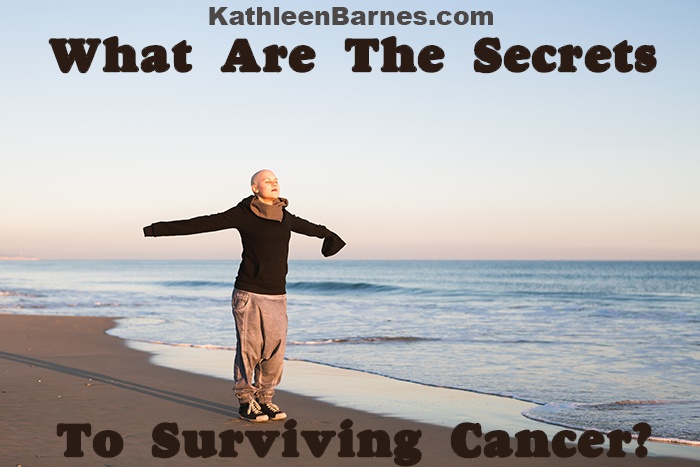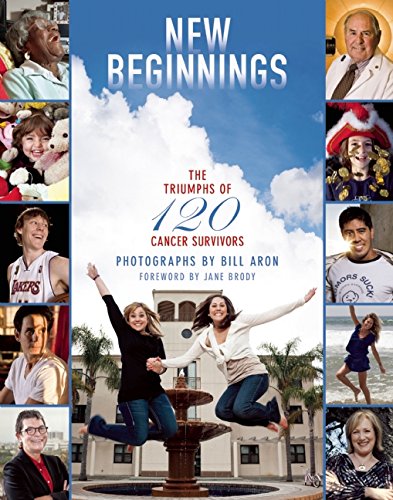Too many of us think a diagnosis of cancer is a death sentence. The truth is that more and more people are surviving cancer. There are 14.5 million cancer survivors in the U.S. today, according to the American Cancer Society. In this column, I won’t go into the minutiae of the types of diagnoses and how those numbers may be skewed.
Instead I want to focus on a conversation I had recently with Bill Aron, author and photographer of an extraordinary new book, New Beginnings: The Triumphs of 120 Cancer Survivors.
Aron is himself a cancer survivor, with two bouts under his belt, one in 1993 and another in 2004. He says his own experience with cancer led him to reach out to other cancer survivors to share stories. It’s clear from his photos that Aron built relationships with his subjects.
Not all are still alive. Some did eventually die of cancer, but Aron was able to discern a pattern of survival that applies to many devastating diseases, and, indeed to an altered approach to life itself.
Here are the four stages of survival that Aron discovered:
- Diagnosis
- Taking charge of your treatment
- Gratitude
- Acceptance your life will never be the same coupled with the opportunity to make positive change.
Diagnosis
The first two steps are pretty straightforward. When a doctor makes the pronouncement that it’s the “Big C,” the world stops. There’s not much else to say about that except that it is devastating. The next three steps are the key ones.
Treatment
In Aron’s case, doctors recommended radiation for a large abdominal tumor in 2004.
“It was serious—a 9 on a 10-point scale. There was a 50% chance of permanent side effects with only a 30% chance they would be able to get the rest of the cancer,” Aron says.
“I didn’t want to do it,” he concluded.
Some doctors refused to treat him if he didn’t buckle under to the radiation. Others yelled at him.
“One accused me of wanting to be my own doctor. That was an ‘Aha!’ moment,” Aron says. He did want to play a role in his own treatment.
Among the subjects in his book are many patients who researched their conditions online and were able to become partners in their treatment.
There were some who made their own treatment choices less successfully, some who battled family resistance and all gained peace of mind from taking charge of their treatment.
Gratitude
“One guy in my cancer support group said cancer was the best thing that ever happened to him. I just stared. I couldn’t believe it!” Aron says.
He explains that cancer gave this man and so many others a chance to re-examine their lives and find what is truly important.
His discovery: “Life is about moments: day by day, hour by hour, sometimes second by second. You realize how many of them you have.”
A positive attitude is an important factor: “There was one guy who started off saying he didn’t believe in statistics, because, he told me, ‘If I did, you’d be talking to a ghost right now.”
Second chances
Living through cancer creates a new perspective on life, Aron says.
One close friend told him, “I don’t want to have cancer, but I’d like an experience that forces that kind of introspection and change in my life.”
People who live through cancer come to a realization that they don’t have to put up with things that have made their lives unhappy and miserable.
One survivor told Aron, “Cancer is a get out of jail free card. For the first time in my life, I felt free to say ‘no‘ to things that were not healthy for me.”
Contact Bill Aron at billaron.com.









Thanks, Kathleen. I totally agree with your friend. I’m trying to get Rosemary off her exemestane and xgiva. I know that her Onc doesn’t believe that she can be cured. Both these medicines can cause bone and other problems. His response was: ‘SO?”!
We’re using DIM, wheat grass, proteolitic enzymes, Essiac etc. He says that my herbs don’t seem to be “interfering” with his medicine! I have holes in my tongue! LOL! Attitude is so important!
It’s good to hear from you, Keith. Love to you and Rosemary.